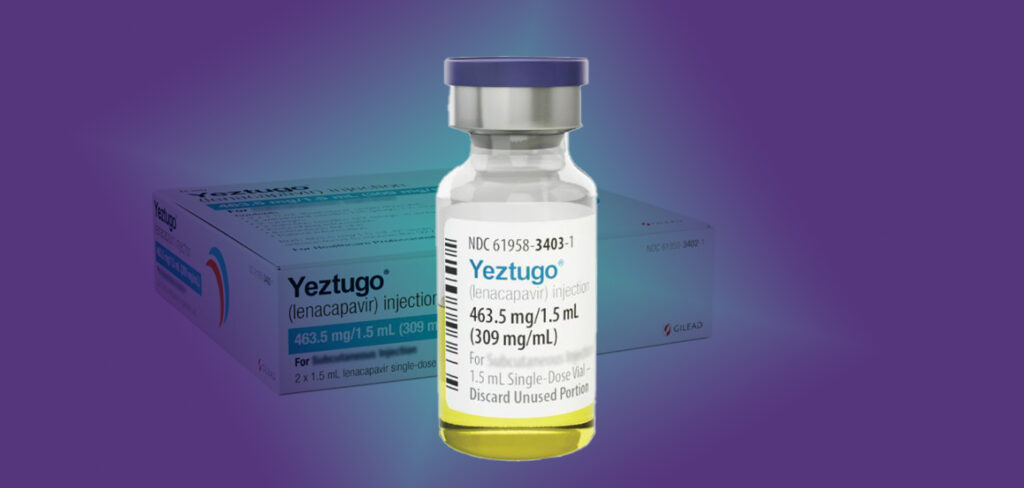FDA Approves First Twice-Yearly PrEP for HIV Prevention
Lenacapavir shows 96% efficacy with minimal side effects and unmatched convenience.

Lenacapavir received FDA approval on June 18, 2025, as the first long-acting, pre-exposure prophylaxis (PrEP) for HIV prevention that is administered in two subcutaneous injections, accompanied by two pills, twice yearly. With breakthrough efficacy and unmatched convenience, it will transform worldwide efforts to manage and prevent HIV transmission.
This breakthrough new drug is marketed by pharmaceutical company Gilead Sciences under the name Yetzugo. Gilead Sciences is the company that pioneered the first PrEP medication in 2012, under the name Sunlenca.
Lenacapavir is part of a class of drugs known as Selective HIV-1 Capsid Inhibitors and works by binding to HIV and disrupting the virus in multiple sectors. This action prevents viral DNA from entering the nucleus of T-cells, thus inhibiting the assembly and replication of new HIV virions. This multiple-site attack strategy makes the drug especially efficacious. Historically, HIV’s mutation rate and virologic variability has enabled it to circumvent most available agents, suppressing their effectiveness and, over time, creating resistance that has inhibited successful treatment and made the possibility of a cure elusive.
In what is considered to be the most important breakthrough in HIV prevention to date, Lenacapavir displayed high efficacy (96%) in trials, a minimal side-effect profile, and high adherence to its easy, twice-yearly dosing schedule.
Dr. Gordon Crofoot of Houston’s Crofoot Research Center played a pivotal role in Lenacapavir’s creation, testing, and approval. Dr. Crofoot administered Lenacapavir for injection into a patient seven years ago as part of the first-in-human trial. Additionally, the Crowfoot Research Center was a top enrolling USA site for testing and research of the drug, prior to approval. Dr. Crofoot also published revelatory research on the treatment, including an article in the New England Journal of Medicine in December, 2024.
Currently approved in several countries and awaiting approval in others, the drug was tested in multiple populations worldwide, including cisgender women and MSMs (Men Who Have Sex with Men) as well as Gender Diverse Individuals. In over 3,000 women aged 16–26, Lenacapavir was found to have 100% efficacy, with zero HIV infections in that cohort. Additionally, 510 pregnancies occurred, and those participants were allowed to remain on the study. This provided important early data on safety during pregnancy. In the MSM testing group, comprised of 2,178 men considered at high risk of contracting HIV, Lencapavir showed a 96% efficacy with only 2 HIV infections, versus 39 in the background population
There was a high degree of protection across a diversity of testing sites throughout the US, Latin America, and Africa, especially in locales confronted with real-world adherence challenges in using medications that required more frequent dosing. With two treatments yearly, high adherence, efficacy in both men and women, and minimal side effects, Lenacapavir contributes to both physiological and psychological wellness, especially for those who struggle with the stress of daily pill routines and self-inflicted stigma.
Lenacapavir, which received FDA approval on June 18, 2025, as the first long-acting PrEP administered twice yearly, is poised to transform global efforts to prevent HIV transmission.
The initial concerns about the drug—including mild injection site reactions, the need for continued long-term safety monitoring, and the possibility of resistance developing over time—all pale in comparison to its substantial public health benefit. Cost and access in some regions may be challenging but are being addressed. In a recent call with manufacturer Gilead Sciences, Crofoot discussed those issues, especially with regard to challenging populations and geographic locations. According to Gilead, they are partnering with six international generic manufacturers to provide reduced-cost versions in 120 low- and middle-income countries. Gilead is actively assisting these countries in accelerating local regulatory approvals for PrEP use.
In the US, Gilead will partner with specialty pharmacies to ensure access and distribution, and is negotiating with insurance providers to quickly secure inclusion of Lenacapavir in their respective formularies. According to Gilead, patient-assistance programs and advanced-access programs will be available for both insured and uninsured patients.
Gilead does not expect any FDA prescribing restrictions—approval is anticipated for anyone who wants to use this formulation. Given its efficacy, they are motivated to ensure anyone who is a candidate for PrEP can access it. The company plans to collaborate with nonprofits to expand outreach and access for underserved populations.
In announcing the FDA approval Gilead stated, “Gilead is committed to helping to ensure that people without insurance will be able to benefit from Lenacapavir, and for those who are eligible, Gilead’s Advancing Access medication assistance will provide it free of charge.”
In terms of delivering this treatment to patients, a well-established infrastructure for providing PrEP already exists. Longstanding entities, including PEPFAR, (US President’s Emergency Fund for AIDS), Global Fund (The Global Fund to Fight AIDS, Tuberculosis and Malaria) and UNAIDS (The Joint United Nations Programme on HIV and AIDS) have decades of experience in HIV prevention and medication distribution.
Amidst the current political climate, there is serious concern about availability of this drug. The US has been, until now, the single largest worldwide funder of HIV medication and prevention initiatives. In spite of Lenacapavir’s groundbreaking effectiveness, there is real concern that current political initiatives—the downsizing of the Federal Health Budget and all of America’s global AIDS initiatives—could hinder access and availability, both domestically and worldwide.
The importance of this drug cannot be overstated. The well-respected journal Science named Lenacapavir its “Breakthrough of the Year” for 2024. Advocates and others are pushing for wide distribution to every individual who needs it, especially since Gilead stated that it can manufacture 10 million doses by 2026, enough to treat 2.5 million patients.
According to Dr. Crofoot: “Twice-a-year PrEP is groundbreaking. We’re testing once-a-year PrEP—almost a vaccine. It’s the future of HIV prevention.”










